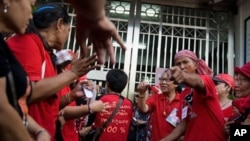Rights activists in Thailand have criticized laws designed to protect the monarchy and police the Internet after a stiff prison sentence was handed down to the operator of an anti-government website.
Challenge to online free speech
Activists raised concerns after the sentencing this week of an anti-government website operator to 13 years in prison. A Thai court gave Thanthawut Taweewarodomkul 10 years for defaming the monarchy and three years for committing computer crimes.
Laws to protect the revered monarchy from defamation, called "lese majeste", are among the strictest in the world and carry a penalty of up to 15 years in prison.
Anyone can raise accusations of lese majeste, and police are obliged to investigate, while details of alleged crimes are rarely made public as anyone repeating or publishing them can also be prosecuted.
Use of lese majeste
Amnesty International Thailand specialist Benjamin Zawacki says the law places Thailand out of compliance with the international covenant on civil and political rights, which it has signed and ratified.
"The lese majeste law, in addition to being in and of itself problematic as a law, has also been abused and misused on both sides of the political divide for purposes of political point scoring," Zawacki said.
Thanthawut was arrested last year for postings on his website during a mass anti-government protest by demonstrators known as Red Shirts. They occupied parts of Bangkok for several weeks demanding new elections.
The government ordered the military to end the protest by force, resulting in clashes that killed 90 people, most of them civilians.
Thanthawut’s website supported the protesters.
Human rights lawyer Somchai Homlaor, the secretary general of Thailand’s human rights and development foundation, says he was targeted.
"Many people now may [cause] offense [according to] the lese majeste law. But, [only] some cases that the authority pick up. Some cases, mainly the ones who are opposed to the government," he said.
Somchai says the number of accusations of defaming the monarchy has increased along with Thailand’s deepening political divisions.
The issue is also more sensitive as Thailand’s revered 83-year-old King Bhumibol Adulyadej has been hospitalized since 2009. The Thai King is the world’s longest-reigning monarch and a unifying force in Thailand.
Thai authorities argue the strict laws are needed to protect the institution.
Thanthawut was also sentenced under the Computer Crimes Act which prosecutes a number of computer-related offenses such as hacking and spreading viruses. But the 2007 law also criminalizes the spread of information by computer deemed a threat to national security.
Many refrain from criticism
Zawacki says the vague definition and broad scope limits free speech.
"Broadly speaking it has a chilling effect on what people feel they're able to say here. Because it is not clear in most cases what one can say that will run one afoul of the law. And, therefore, people err on the side of saying almost nothing at all,” Zawacki stated. “And, the argument is that that is what these laws are ultimately designed to do, which is to chill freedom of expression and keep people from speaking at all about certain topics."
Another website operator is facing similar charges as part of what rights groups say is a pattern of growing political censorship of the Internet. The editor of the independent news website Prachatai Chiranuch Premchaiporn, was charged with failing to quickly remove several comments posted on her website deemed insulting to the monarchy.
Her trial resumes in September and she is facing up to several decades in prison if found guilty.
The computer crimes act is just one tool being used for political censorship of the internet in Thailand.
The Thai government has blocked thousands of anti-government websites under emergency laws enacted during last year’s protest.
Authorities say they were inciting unrest and that they will eventually be unblocked after harmful content is removed.
Rights Activists say Thai Laws Abused for Political Purposes




